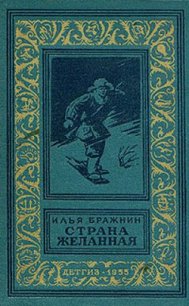Октябрьская страна (The October Country), 1955 - Брэдбери Рэй Дуглас (читаемые книги читать .txt) 📗
"But you've got to get up," she said.
He half-turned. Sunlight prickled black hairs into bronze on his upper lip. "Why? Why, in Christ's name, do I have to get up?"
"You need a shave!" she almost screamed.
He moaned. "So I have to get up and lather myself at eight in the morning because I need a shave."
"Well, you do need one."
"I'm not shaving again till we reach Texas."
"You can't go around looking like a tramp!"
"I can and will. I've shaved every morning for thirty god-damn mornings and put on a tie and had a crease in my pants. From now on, no pants, no ties, no shaving, no nothing."
He yanked the covers over his ears so violently that he pulled the blankets off one of his naked legs.
The leg hung upon the rim of the bed, warm white in the sunlight, each little black hair-perfect.
Her eyes widened, focused, stared upon it. She put her hand over her mouth, tight.
He went in and out of the hotel all day. He did not shave. He walked along the plaza tiles below. He walked so slowly she wanted to throw a lightning bolt out of the window and hit him. He paused and talked to the hotel manager below, under a drum-cut tree, shifting his shoes on the pale blue plaza tiles. He looked at birds on trees and saw how the State Theatre statues were dressed in fresh morning gilt, and stood on the comer, watching the traffic carefully. There was no traffic! He was standing there on purpose, taking his time, not looking back at her. Why didn't he run, lope down the alley, down the hill to the garage, pound on the doors, threaten the mechanics, lift them by their pants, shove them into the car motor! He stood instead, watching the ridiculous traffic pass. A hobbled swine, a man on a bike, a 1927 Ford, and three half-nude children. Go, go, go, she screamed silently, and almost smashed the window.
He sauntered across the street. He went around the corner. All the way down to the garage he'd stop at windows, read signs, look at pictures, handle pottery. Maybe he'd stop in for a beer. God, yes, a beer.
She walked in the plaza, took the sun, hunted for more magazines. She cleaned her fingernails, burnished them, took a bath, walked again in the plaza, ate very little, and returned to the room to feed upon her magazines.
She did not lie down. She was afraid to. Each time she did she fell into a half-dream, half-drowse in which all her childhood was revealed in a helpless melancholy. Old friends, children she hadn't seen or thought of in twenty years filled her mind. And she thought of things she wanted to do and had never done. She had meant to call Lila Holdridge for the past eight years since college, but somehow she never had. What friends they had been! Dear Lila! She thought, when lying down, of all the books, the fine new and old books, she had meant to buy and might never buy now and read. How she loved books and the smell of books. She thought of a thousand old sad things. She'd wanted to own the Oz books all her life, yet had never bought them. Why not? while yet there was life! The first thing she'd do would be to buy them when she got back to New York! And she'd call Lila immediately! And she'd see Bert and Jimmy and Helen and Louise, and go back to Illinois and walk around in her childhood place and see the things to be seen there. If she got back to the States. If. Her heart beat painfully in her, paused, held on to itself, and beat again. If she ever got back.
She lay listening to her heart, critically.
Thud and a thud and a thud. Pause. Thud and a thud and a thud. Pause.
What if it should stop while she was listening?
There!
Silence inside her.
"Joseph!"
She leaped up. She grabbed at her breasts as if to squeeze, to pump to start the silent heart again!
It opened in her, closed, rattled and beat nervously, twenty rapid, shot-like times!
She sank on to the bed. What if it should stop again and not start? What would she think? What would there be to do? She'd die of fright, that's what. A joke; it was very humorous. Die of fright if you heard your heart stop. She would have to listen to it, keep it beating. She wanted to go home and see Lila and buy the books and dance again and walk in Central Park and-listen-
Thud and a thud and a thud. Pause.
Joseph knocked on the door. Joseph knocked on the door and the car was not repaired and there would be another night, and Joseph did not shave and each little hair was perfect on his chin, and the magazine shops were closed and there were no more magazines, and they ate supper, a little bit anyway for her, and he went out in the evening to walk in the town.
She sat once more in the chair and slow erections of hair rose as if a magnet were passed over her neck. She was very weak and could not move from the chair, and she had no body, she was only a heart-beat, a huge pulsation of warmth and ache between four walls of the room. Her eyes were hot and pregnant, swollen with child of terror behind the bellied, tautened lids.
Deeply inside herself, she felt the first little cog slip. Another night, another night, another night, she thought. And this will be longer than the last. The first little cog slipped, the pendulum missed a stroke. Followed by the second and third interrelated cogs. The cogs interlocked, a small with a little larger one, the little larger one with a bit larger one, the bit larger one with a large one, the large one with a huge one, the huge one with an immense one, the immense one with a titanic one….
A red ganglion, no bigger than a scarlet thread, snapped and quivered; a nerve, no greater than a red linen fiber twisted. Deep in her one little mech was gone and the entire machine, unbalanced, was about to steadily shake itself to bits.
She didn't fight it. She let it quake and terrorize her and knock the sweat off her brow and jolt down her spine and flood her mouth with horrible wine. She felt as if a broken gyro tilted now this way, now that and blundered and trembled and whined in her. The color fell from her face like light leaving a clicked-off bulb, the crystal cheeks of the bulb vessel showing veins and filaments all colorless….
Joseph was in the room, he had come in, but she didn't even hear him. He was in the room but it made no difference, he changed nothing with his coming. He was getting ready for bed and said nothing as he moved about and she said nothing but fell into the bed while he moved around in a smoke-filled space beyond her and once he spoke but she didn't hear him.
She timed it. Every five minutes she looked at her watch and the watch shook and time shook and the five fingers were fifteen moving, reassembling into five. The shaking never stopped. She called for water. She turned and turned upon the bed. The wind blew outside, cocking the lights and spilling bursts of illumination that hit buildings glancing sidelong blows, causing windows to glitter like opened eyes and shut swiftly as the light tilted in yet another direction. Downstairs, all was quiet after the dinner, no sounds came up into their silent room. He handed her a water glass.
"I'm cold, Joseph," she said, lying deep in folds of cover.
"You're all right," he said.
"No, I'm not. I'm not well. I'm afraid."
"There's nothing to be afraid of."
"I want to get on the train for the United States."
"There's a train in Leon, but none here," he said, lighting a new cigarette.
"Let's drive there."
"In these taxis, with these drivers, and leave our car here?"
"Yes. I want to go."
"You'll be all right in the morning."
"I know I won't be. I'm not well."
He said, "It would cost hundreds of dollars to have the car shipped home."
"I don't care. I have two hundred dollars in the bank home. I'll pay for it. But, please, let's go home."




